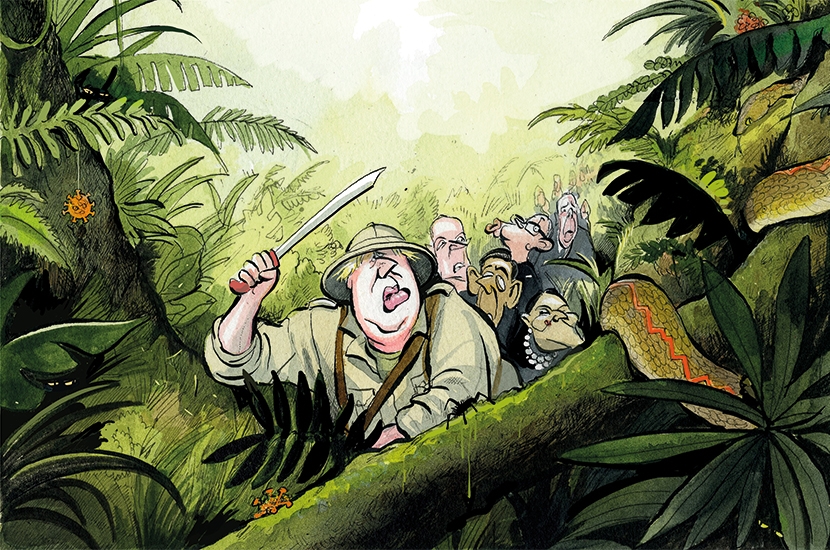Last year Boris Johnson won three notable domestic political victories. His hot streak began when he romped home in the Tory leadership contest and culminated with his decisive general election win.
Between those two landmark moments was an event that served as a bridge between them – a decisive purge of the pro-Remain centrist tendency inside the Conservative parliamentary party. Many of the leading names in Tory circles for the past 20 years were bounced out of the party and then the Commons over their Brexit-blocking antics.
Suddenly the game was up for Philip Hammond, David Lidington, David Gauke, Amber Rudd, Justine Greening, Rory Stewart, Dominic Grieve, Oliver Letwin, Ken Clarke and Nicholas Soames, among others. And instead of the British public reacting to the purge in horror – as predicted by many BBC types – many people lapped it up and were convinced that at last a Prime Minister was placing their democratic wishes above the conventions of the old mates club at Westminster.
It is fair to say that when Rudd, who had renounced the whip in sympathy with her colleagues, found herself live on Channel Four’s election night coverage as the result of the exit poll came through, the rictus grin decorating her face did not speak of unalloyed joy.
So far so good, from a Brexit-supporting point of view. But the trouble is that when you lose so many experienced front-rank politicians in one go you need to replace them. There were a few stout Brexiteers for Johnson to turn to, such as Priti Patel and Dominic Raab. A necessary accommodation was also reached with the giant brain of Michael Gove.
But many cabinet positions were filled by members of the careerist tendency – predominantly Remainers who decided that they would after all be prepared to serve in the cabinet of a PM willing to contemplate a no-deal Brexit.
Matthew Hancock, who opposed Johnson so vigorously in the early stages of the leadership contest and then flip-flopped back to him, was rewarded by keeping the health brief. Those bright lads Robert Jenrick and Oliver Dowden were also influential Johnson backers from the careerist wing, along with long-term Brexiteer Rishi Sunak. All three were found seats at the cabinet table. And the ideologically elastic Grant Shapps and Gavin Williamson (Boris’s leadership contest numbers man) won themselves recalls.
Nearly all these people are perfectly clever and capable. But none could be thought of as especially driven by a firm set of principles and beliefs. Indeed, Mr Jenrick in particular was so unattached to any particular cause or outlook that some backbenchers began privately referring to him as Mr Generic.
Under the tactical formation envisaged by Boris Johnson and Dominic Cummings – best summarised as a flat back ten with one superstar striker up front to score all the goals – this did not seem to matter much.
But it has begun to matter now. Because the superstar striker has become unsure of himself and his team-mates, most of whom lack their own lodestars to guide them, don’t know what to do.
Hence Oliver Dowden’s slow and hesitant responses to woke cultural challenges such as Premier League footballers taking a knee for BLM and the proposed Last Night of the Proms lyric-ban. Hence the sheer misery that Mr Williamson lived through during the exams fiasco.
Only Sunak, the one who was most cruelly billed as the Prime Minister’s sycophant when he took over the reins at the Treasury, has shown the self-confidence to set his own course in his own brief.
Across the rest of the political terrain the whispers emanating from Whitehall suggest that the guiding lights of policy formation now are focus groups and opinion polls run out of Downing Street. It is all starting to smack of Norman Lamont’s ‘in office but not in power’ jibe at John Major. But Major was a fag end PM with a tiny majority. This should not be happening to Johnson.
A new nadir was hit this week when two successive cabinet ministers, first Hancock and then Shapps, failed to resolutely defend the idea of appointing former Australian PM Tony Abbott as the UK’s trade envoy. The woke orthodoxy has it in for Abbott due to one or two ropey comments he made way back when and because of his general conservative stance on social issues. The grassroots Tory tribe loves the sound of him.
Hancock was poorly briefed and stumbled when Sky’s Kay Burley unleashed her wrath upon him. But Shapps, one of the cabinet’s most fluent media performers, simply decided not to stick his neck out for Abbott, refusing even to say he that would be willing to go for a drink with him.
Whose fault is this? It would be easy to rail against Shapps on the grounds of him ‘not believing in anything’. But I am afraid the real culprit is a prime minister who has not given a sufficient lead in recent weeks and is no longer trusted by cabinet colleagues not to hang them out to dry by executing yet another focus grouped U-turn.
An array of moderately able careerists would love to have the courage of the Prime Minister’s convictions – if only they knew what they were.







Comments